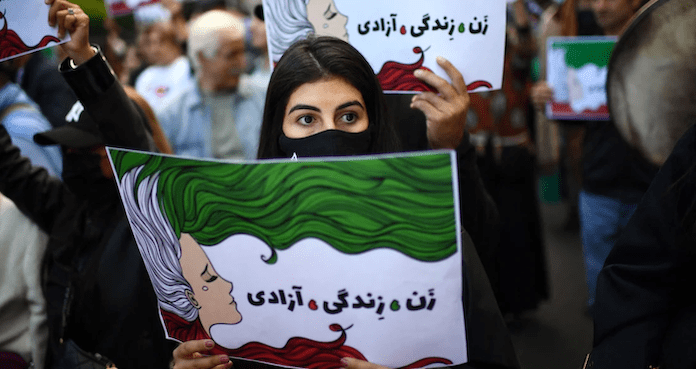The Iranian regime’s brutal killing of 22-year-old Mahsa Amini — who was reportedly brutally beaten after she was detained for showing too much hair — has triggered nationwide protests, led by the nation’s granddaughters against the grandfathers who have ruled their country for over four decades.
It’s premature to assess whether these protests will meaningfully change Iran’s politics, or whether they are simply another crack in the edifice of a rotting regime whose lone source of diversity is whether the beards and turbans of its ruling men are black or white. Yet one conclusion can already be drawn: Amini’s killing, and Iranian society’s response to it, should permanently alter how the outside world interacts with Iranian officials. And that shift in awareness should also include a fundamental reassessment of its own Iran policy by the Biden administration.
Amini’s case was not isolated. According to human rights groups, every year millions of women are stopped and harassed in Iran for “improper hijab”, and numerous Iranian women are serving double-digit prison sentences for refusing to veil. This system of institutionalized violence has little to do with presumed Iranian religious traditions; authentic cultural norms don’t need to be imposed by the threats of a police state.
Compulsory hijab is one of the three remaining ideological pillars of Iran’s theocracy, along with “Death to America” and “Death to Israel”.
That helps to explain why the regime is so loath to take a soft line on the issue of dress codes. Iran’s supreme leader, Ayatollah Ali Khamenei, clearly believes that compromising on the regime’s ideological pillars — including hijab — will only hasten its collapse. “If we want to prevent our society from being plunged into corruption and turmoil”, Khamenei has said, “we should keep women in hijab”. It is a product of the same mentality that blames female sexual assault victims for dressing immodestly. Such antiquated views deserve no deference, whether espoused from Texas, Tokyo or Tehran.
The week of Amini’s death, CBS News correspondent Lesley Stahl interviewed hard-line President Ebrahim Raisi, who predictably raised doubts about the Holocaust and denied his well-documented role as a hanging judge who sentenced thousands of dissidents to death in the summer of 1988. Stahl wore a headscarf throughout the interview and admitted: “I was told how to dress, not to sit before he did, and not to interrupt him”. These outmoded rules of engagement should no longer be acceptable.
On Thursday, CNN’S Christiane Amanpour was granted an interview with Raisi in New York, but when she refused to wear the hijab, he didn’t show up. This was the correct response; now others should follow suit. History has proven that Iran only compromises when faced with a unified international front. Foreign governments, international news agencies and nongovernmental organizations should cease legitimizing the Islamic republic’s gender discrimination.
While Tehran has on occasion bowed to external pressure, throughout its 43-year history the Islamic republic’s sole response to internal crises has been to double down on repression. It is this brutality that has sustained the government. But there are growing fractures in the foundation, at a time when the country is braced for a potential leadership transition due to 83-year-old Khamenei’s uncertain health. While the Islamic republic’s security forces may appear in control for the moment, there are far more signs of regime frailty in Iran today than there was in Egypt and Tunisia in December 2010, weeks before their governments were overthrown.
The unrest triggered by Amini’s killing should push the Biden administration to reassess its Iran strategy. Until now, the sole focus of U.S. policy toward Iran has been a fruitless attempt to revive the 2015 nuclear agreement that President Donald Trump exited in 2018. This is shortsighted. So long as the leaders of the Islamic republic — whose identity is premised on opposing the United States — rule Iran, Washington will never be able to reach an accommodation with Tehran. Rather than responding to the symptoms of Iran’s ideology, Washington — and the West — must focus on its root cause, the regime itself.
The advent of a representative Iranian government that puts the country’s national interests before its revolutionary ideology could be a geopolitical game changer for the United States. Tehran has enormous influence in four Arab capitals — Damascus, Beirut, Baghdad and Sanaa — and has provided financial and military aid to anti-American dictatorships in Caracas and Pyongyang. The Russian government has begun using Iranian kamikaze drones against Ukraine. Iranian arms are fueling Africa’s wars.
In virtually every cold or hot war in the world today, Tehran aligns itself against the United States.
During the Cold War, the United States negotiated arms control deals with the Soviet Union even while denouncing the “evil empire” and imploring Soviet leader Mikhail Gorbachev to “tear down this wall”. It is time for the Biden administration to broaden its Iran strategy not only to focus on countering the destructive aspirations of the Iranian regime, but also to champion the aspirations of the Iranian people to live in a free society at peace with the world.
Iran’s transition from theocracy to democracy may not come easily, peacefully or soon. But it is the single most important key to transforming the Middle East.
Karim Sadjadpour is a senior fellow at the Carnegie Endowment for International Peace.
The Washington Post

